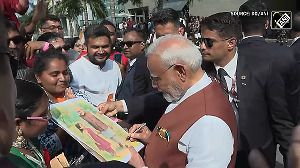The European Union has agreed 'in principle' to have a common DNA protocol for basmati, giving a shot in the arm to Indian exporters.
India wants a common protocol as the commodity is geographically grown only in India and Pakistan and EU's verification system will have to be based on a uniform protocol to avoid confusion.
While the EU has 'in principally' agreed to it, the modalities are yet to be finalised as to when it would be implemented and what would be the final protocol, official sources told PTI.
Indian officials are expected to hold a meeting with their EU counterparts next month in this regard.
The DNA (deoxyribo nucleic acid) protocol has been prepared with a view to address the problem of fraudulent basmati exports to the EU.
The protocol once implemented would help the European authorities to distinguish between basmati and non-basmati varieties, especially in wake of the fact that basmati enjoys zero tariff there.
EU, however, will have to develop their own verification methods based on the common protocol.
India's basmati DNA protocol has been developed by the Centre for DNA Finger Printing and Diagnostics in Hyderabad and is the only institute for conducting such high-end research.
Country's annual basmati exports are estimated at 700,000 tonnes to 800,000 tonnes.





